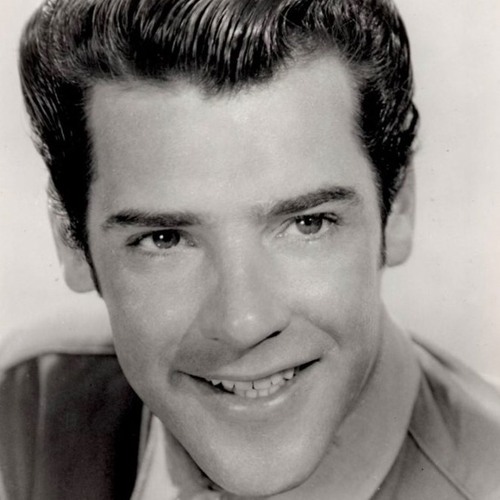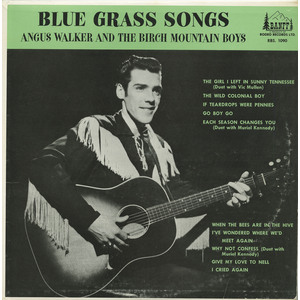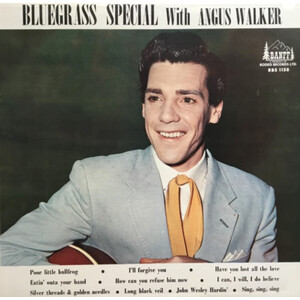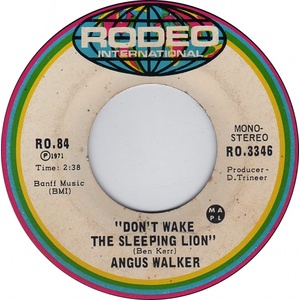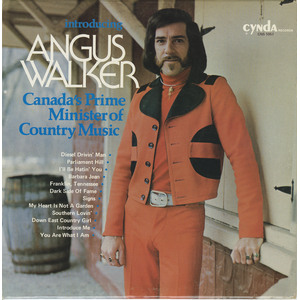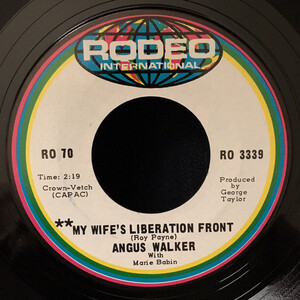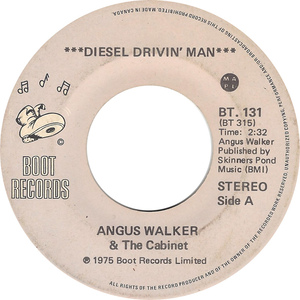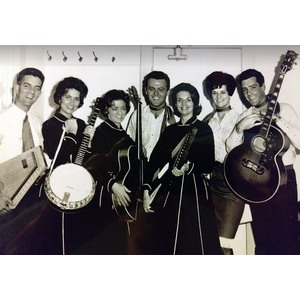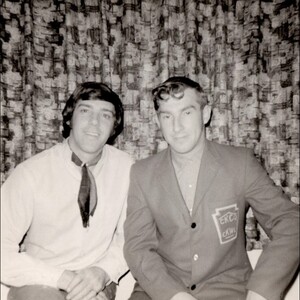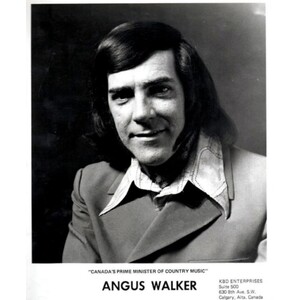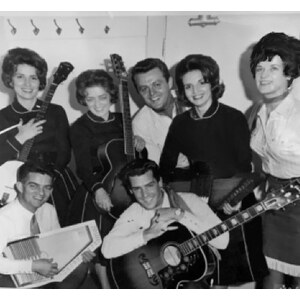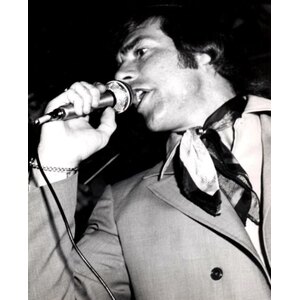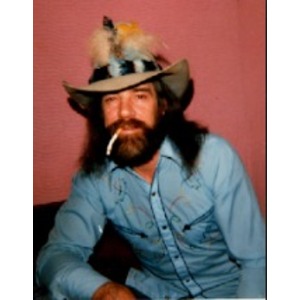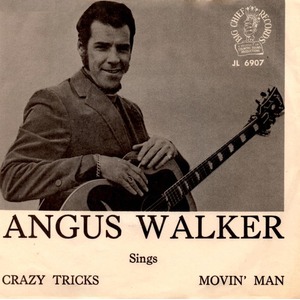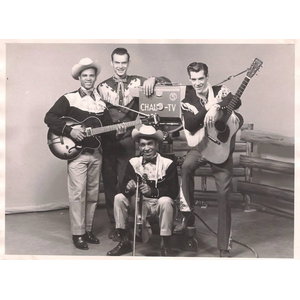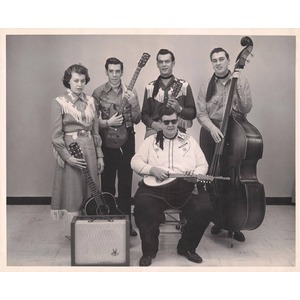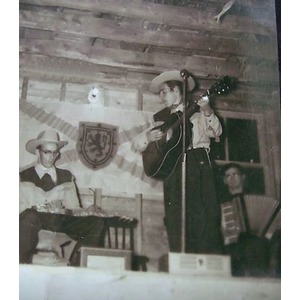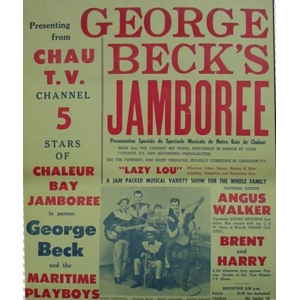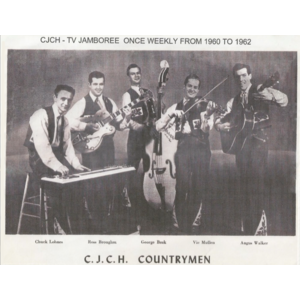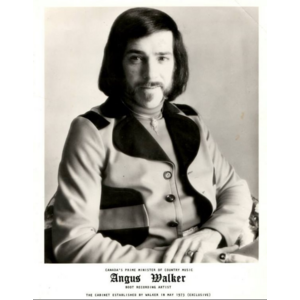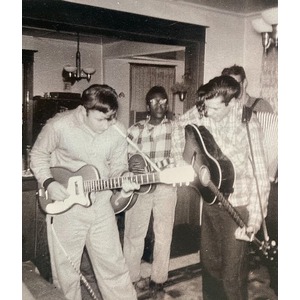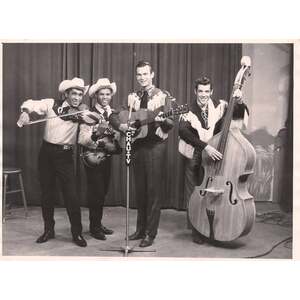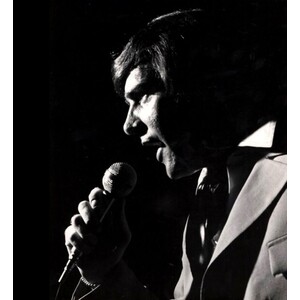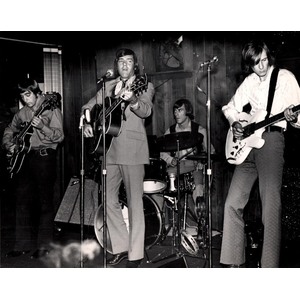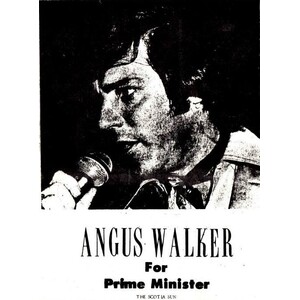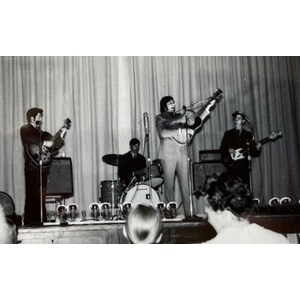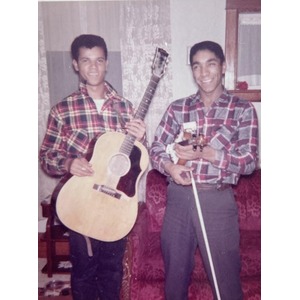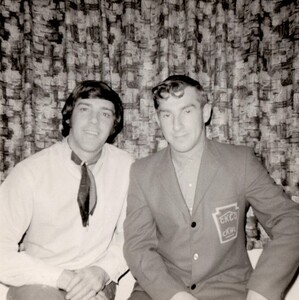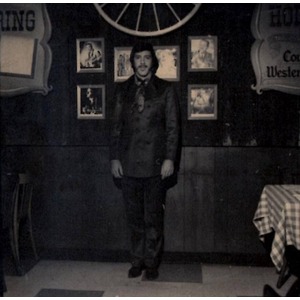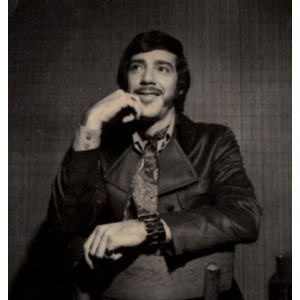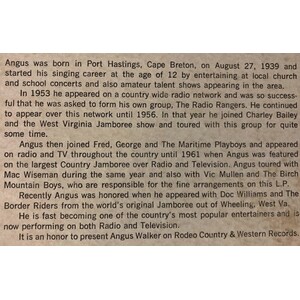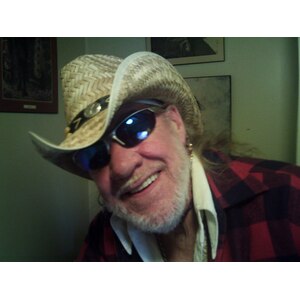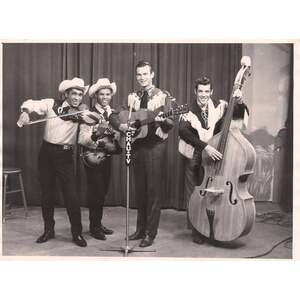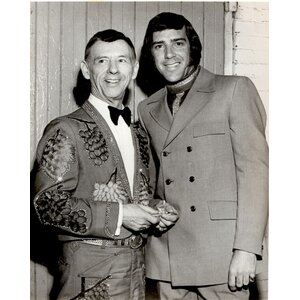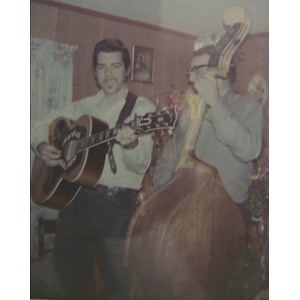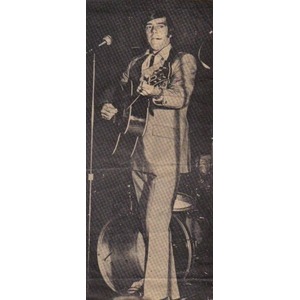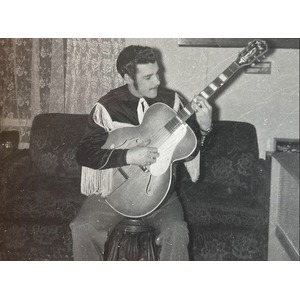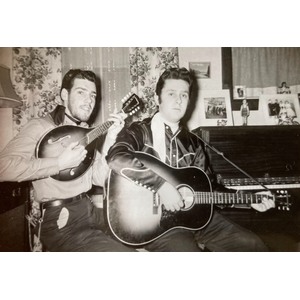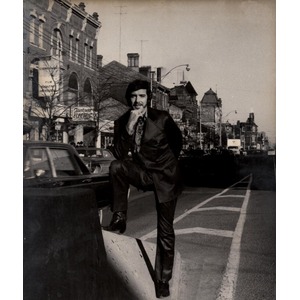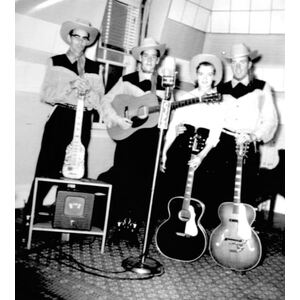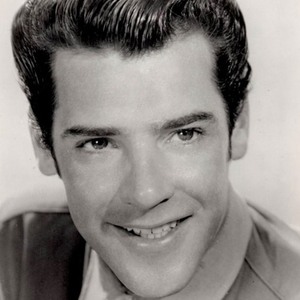Walker, Angus
Websites:
https://anguswalkerca.wixsite.com/capebretonrebel
Origin:
Port Hastings, Cape Breton, Nova Scotia, 🇨🇦
Biography:
Joined MOCM December 12, 2023, passed away Nov 7, 2024
Angus Reynolds Walker (born August 27, 1939) was a Canadian bluegrass and country musician from Port Hastings, Cape Breton, Nova Scotia. He has been called "Canada's Prime Minister of Country Music" and "The Cape Breton Rebel".
Walker has appeared as a vocalist, upright bass and rhythm guitar player with various groups and artists. He has been featured on several albums and singles for various labels including Boot and Rodeo Records in addition to making numerous radio and television appearances such as CBC's Countrytime. He has worked with Fred McKenna, Vic Mullen, Don Messer, Mac Wiseman, Charley Bailey, Doc Williams, and Ben Kerr, Marg Osborne and Brent Williams, among others.
Walker's music career began at the age of 12, performing at local venues until 1953, when he began to appear with Ron Spencer, Cris Chisholm and Earl Chisholm as part of the Radio Rangers on CJFX Radio. After 1956, he appeared as part of the West Virginia Jamboree Show with Charley Bailey and later toured with future Canadian Country Music Hall of Fame alumni Fred McKenna and George Beck as a member of Beck's "Maritime Playboys". Walker also participated and won the "CBC Talent Caravan", which was held at Saint Francis Xavier University and adjudicated by Glenn Sarty. Around the same time, Walker played the upright bass, rhythm guitar and sang in various roles with The Birch Mountain Boys who consisted of Vic Mullen usually playing banjo, Brent Williams playing fiddle and providing vocals, guitar and harmony and Harry Cromwell on mandolin, lead guitar and singing harmony. Eventually, he became a full fledged member of the group. Walker and the group became one of the earliest performers of Canadian Bluegrass music in the early 1960s. The group performed at small venues in places such as Ingonish, Neil's Harbour, Baddeck, Waycobah, Port Hawkesbury, Goldboro, and Cheticamp, among others.
After The Birch Mountain Boys disbanded in 1961, Walker became part of The CJCH Countrymen. The group was assembled via audition by CJCH for their program which was "...the first cross-country television show of country music ever to originate in Halifax" titled "The CJCH Countrymen Jamboree". The CJCH Countrymen consisted of Walker (lead vocal and rhythm guitar), Beck (bass), Mullen (fiddle and banjo), Chuck Lohnes (steel guitar) and Ross Broughm (lead guitar). During this time, The Countrymen were the house band for the aforementioned TV show while also performing on the road with notable performers such as Mac Wiseman, Doc Williams and The Border Riders, Marg Osborne and Tommy Common. Later, Beck then Walker reunited with Williams and Cromwell, who had already relocated to the Gaspe area as part of Beck's latest iteration of "The Maritime Playboys" who performed on weekly TV show for CHAU in Carleton, Quebec. In 1963, Walker transitioned to Montreal where he eventually joined Dougal Trineer's band "The Hackamores" mostly appearing as a rhythm guitarist and harmony singer, along with Paul Menard on fiddle, June Davey supplying bass and vocals and Trineer as lead guitarist and singer. The group backed "...many of the country records out of Montreal" at the time, in addition to playing at several venues in the Montreal and Toronto areas such as the Blue Angel, The Wagon Wheel and The Monteray Club where The Hackamores were considered the main attraction for a time.
Four of Walker's singles charted above the top 50 in RPM Magazine's weekly ranking of Country music songs between 1965 and 1971. Cadillacin' Around, written by Will Odo and recorded with The Hackamores, plateaued at #2 and gained him "national popularity" before winning the RPM Gold Leaf Award (later known as the Juno Awards) for "Most Promising Male Country Singer" in 1965. Due to these successes, by 1966 he was receiving "much recognition as an up and coming country singer". Peaking at #35 in 1970 was Crazy Tricks, written by Merv Smith and produced by Dick Damron and recorded in Edmonton. During this time in Alberta, Walker continued to have popularity in Quebec and the Atlantic provinces. In 1971, two of Walker's recordings reached the top 50 starting with the self-penned Canadian Country Music Man which featured Marie Babin (vocals) and "first call" studio lead guitarist Mickey McGivern, reaching as high as #22. Later that year, Parliament Hill, written by Ben Kerr and produced by Trineer, peaked at #18 on RPM Weekly's Country song listing.
In the fall and winter of 1970 and 1971, now known as Canada's Prime Minister of Country Music, Walker made appearances on CBC's Countrytime and on May 12, 1971, Walker joined folk performer and television personality Don Messer on a tour across Canada. Additionally, Walker performed Parliament Hill on an episode of The Don Messer Show that aired on January 29, 1972 on CJAY-TV. Walker also spent time playing at The Dunes nightclub in Hawaii, starting in 1972 along with Bobby Munro on piano and Doug Lewis on bass. Upon returning to Canada, Walker assembled his own exclusive band known as "The Cabinet" featuring lead guitarist Steve Lau whom he had met during his time in Hawaii and brothers, Larry and Henry Brennan, on drums and bass, respectively. In 1975, Walker received "heavy east coast airplay for his Diesel Drivin' Man single", recorded with The Cabinet and also made an appearance on The Ian Tyson Show backing Jim and Don Haggart. Walker began an indefinite hiatus from his music career due to medical issues in 1977 although he did occasionally record songs and perform after 1989 as "The Cape Breton Rebel".
Angus Reynolds Walker is a timeless musical talent who has recorded, wrote and played many genres over the years and is one of the most accomplished early Nova Scotian pioneers of bluegrass music. He has mostly focused on playing rhythm guitar and lead vocals but has experience with other instruments such as the fiddle and dog house base in addition to singing harmony on a few occasions. His early musical inspirations were Johnny Paycheck and Jimmy Martin among a multiplicity of others, some of whom Angus has had the pleasure to meet or briefly play with over the course of his career. Angus first started playing guitar at the age of ten and during the next few years, Angus developed his musical talents and made his first recordings including "The White Rose" which is a traditional Cornish folk song during his early adolescence.
Ronald Spencer was an early musical mentor that was responsible for booking Angus' first live performance in Grand Anse, Cape Breton Island with Roland Wilkie playing tenor banjo, Knobbie Bro on accordion and Ronnie on steel top guitar. Angus, Ronnie and others also recorded at CJFX radio station in Antigonish, Nova Scotia.
When he was fifteen, he obtained a new job working for the Department of Transportation until fate seemed to intervene. While on the road, George Beck, who was the lead for "The Maritime Playboys" had heard of Angus' talents due to his involvement in a local radio interview and immediately sought him out for the purposes of taking him on the road as a part of his group. This was Angus' first experience with touring and his schedule continued to become busier over the next decade and beyond. It was also during this era that Angus began his involvement with Pete MacDonald and The Country Gentlemen and played various venues in the Montreal area in addition to others with them. This experience, among many others, was as much as an opportunity to acquire new skills from a plethora of talented artists as it was to increase his exposure in Canada and beyond.
In 1959, Angus began working with the talented Vic Mullen, Harry Cromwell, Brent Williams and others producing, performing and writing bluegrass music as The Birch Mountain Boys. It was also during this time that Angus began writing and composing his first original songs including "Hit Parade of Love" and "I'll Forgive You" as well as a number of covers including "Give my Love to Nell", "Long Black Veil" and "The Wild Colonial Boy" among many others. The Birch Mountain Boys were among the early pioneers of bluegrass music in Nova Scotia and entertained fans with their skillful playing, singing and harmony and were able to masterfully put their unique Maritime bluegrass flavor to earlier gospel, country, folk and other traditional songs. This was possible because each member of the group were each creative and otherwise talented in their own rights. Over the years, The Birch Mountain Boys continued to tour and record together in addition to developing careers individually or in other groups, across several genres of music until their separate endeavors caused them to disband in the mid sixties.
Angus continued to tour and perform with various artists from the sixties while recording various songs which had continued to gain him increasing notoriety across Canada. At this point, much of Angus' music had more of a country flavor and he began working with Dougie Trineer, Paul Minard, June Davis as The Hackamores. Some of their songs received airplay during this time period as well, with the recording "Cadillacin' Around" (which was originally written by Willie Odo), reaching as high as number 2 on the RPM music charts in 1965. Because of his previous accomplishments and the exposure the success of this song caused, in that year Angus was Awarded the RPM Gold Leaf Award for most Promising Country Singer with renowned song writer and performer Gordon Lightfoot receiving the Folk Artist of the Year Award as determined by a poll of notable DJ's. This was one of the first times that a Nova Scotian and Cape Bretoner had won a country award in Canada. The RPMawards eventually evolved into The Juno Awards which continue to be Canada's most revered musical award to this day. He continued to write and record various original songs and covers including "Canada's Country Music Man" which also featured singer Marie Babin. The title of that song was his stage name for quite some time until a new development occurred in his career. Other popular songs during this time included his covers of "Crazy Tricks" and "Movin' Man" in addition to others that were featured on different compilation albums and singles.
In the 1970's, Angus began recording working with Ben Kerr in various capacities who helped him to make advances in promoting his career under the stage name of "The Prime Minister of Country Music". This name comes from a song Kerr wrote called "Parliament Hill" which in addition to other events, helped him to gain more exposure. Kerr was planning on having Angus run in the US election after recording "Washington D.C." until Angus suggested doing so in Canada instead. Shortly thereafter, Kerr had written the song which was promptly recorded and different versions were included on a single and an album. Angus toured prolifically during the time, performing not only at venues across Canada like McKoys in Gaspe and the Monteray Club in Montreal, but also in Hawaii where he met Steve Lau who eventually joined him back in Canada as the lead guitarist for his new band "The Cabinet" along with Henry Brennan on bass and Larry Brennan on drums. He gained more attention due to the controversial nature of "Parliament Hill", when the Government of Canada enacted legislation banning the further use of the title of the song for commercial use. At this point, Angus' musical style was mostly country inspired with other genres influencing him as well. Along with recordings on several compilation, albums and singles, including many that Angus wrote and other popular songs from the the time period, in 1973 he recorded and released "Introducing Angus Walker: Canada's Prime Minister of Country Music " with The Cabinet in anticipation of the extensive touring that would follow.
Angus' appearances on radio and television shows intensified during this period. He has a long history of appearing with other talents on programs such as "Countrytime with Don Messer" (whom he opened for during a Canada-wide tour) and the "Ian Tyson Show" in addition to him and his bands being featured in a number of publications. His original song, "Diesel Drivin' Man" was the most successful track on his 1973 album and contains numerous references to his contemporaries in music and other notable figures in entertainment. Other popular tracks from that album were "Barbara Jean", "Down East Country Girl" which Angus wrote and covers including "Southern Lovin'" and "Signs" among others. The Cabinet would also include several different members over the years including Steve Brennan who replaced Larry, Joe Don West on bass, Keith Vanderwees on drums and Jerry Parish on lead guitar. Up to the late 70's, Angus and his Cabinets would continue to tour domestically and internationally in addition to composing and recording new material.
In 1979, Angus decided to take a hiatus from his music career and using the many skills working with his hands he had acquired over the years to build homes in Ontario eventually becoming the superintendent of a high rise apartment building in Ottawa for a period of time. During this period Angus was off the road, he still maintained and started connections with many friends, musicians around his home region of Cape Breton Island and New Brunswick and played at many people's houses and other less formal venues. He also performed at The Last Chance Saloon in Perth-Andover, New Brunswick for a period of time. He has a long history also of having a friendships with several local Mi' Kmaq communities among other First Nations across Eastern Canada. Through the 80's into the 90's Angus continued to develop his signature rhythm guitar and continued to master playing the lead guitar in some instances as well. It was at this time, that in his opinion, that he truly began to find his signature vocal style which is usually lower in tone than his earlier recordings, which led to his giving up of the prime ministerial career. It was during a conversation with a good friend, that it was suggested to him that the suit of the Prime Minister did not fit anymore. At that little stop over, "The Cape Breton Rebel" was born. In addition, while reflecting on his encounters with Jesus over the years he wrote and recorded "Living with Jesus", a song which a large part of Angus life story is included in addition to others some of fans have had the pleasure to hear such as "Storm Rider" or "The Drifter".
In 1993, a friend conceived of and wrote a draft version of the song "Pride of the Working Man" which eventually was renamed "The Greater Gets Greater" which chronicles the struggles of various people involved in fishing, farming and manufacturing. These struggles continue to this day. This song was eventually recorded which became popular in some locations. He also performed live in Canso, NS during this period in the company of The Men of The Deep in support of that community's struggles in the wake of the cod industry's collapse in addition to co-writing "Darkest Day in May" in 1993 as a tribute to all those affected by the Westray Mine disaster in Pictou County, NS.
He has continued to write and compose music since then and has entertained friends and strangers alike. He is a friend to many people, across all walks of life with a generous soul who is always out to help when he can. He has been a resident of the community of Antigonish, Nova Scotia for quite some time and can be seen walking the streets interacting with young and old alike. His repertoire of songs that he can play currently is at 2,500 and he's been perfecting several unheard original works, covers and arrangements which his fans are beginning to hear for the first time.
There are more to write about Angus Reynolds Walker's Journey and his music career, Fans who want to know more about Angus music career can do so by filling simply write us and we will get back to them.
